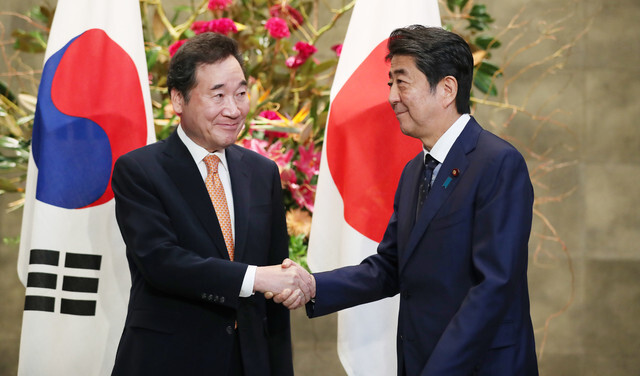hankyoreh
Links to other country sites 다른 나라 사이트 링크
Senior government official says Seoul won’t renew GSOMIA until Tokyo withdraws export controls

Although the prime ministers of South Korea and Japan held their first meeting in a year, a wide gap remains between the two countries’ position in their ongoing disagreement. With the official termination date of their GSOMIA intelligence-sharing agreement scheduled for Nov. 23, some are calling for the agreement to be extended. But a senior official in the South Korean government said that renewing GSOMIA would be unacceptable to the Korean public as long as Japan’s retaliatory measures – that is, its export controls – remain in place.
“There’s just one month left before GSOMIA is terminated, but the public won’t tolerate GSOMIA’s renewal unless Japan reverses its punitive measures. Japan says that it won’t revoke those measures until a solution is found to the forced labor issue. Ultimately, we have to reach an agreement on all three of those issues before [inter-Korean relations] can be repaired,” a senior official who is well-informed about South Korea-Japan relations told reporters on Oct. 25.
“We can’t ask the US to fix South Korea-Japan relations; this is something we have to fix on our own,” the official added
In connection with this, US Assistant Secretary of State for the Bureau of East Asian and Pacific Affairs David Stilwell is scheduled to visit South Korea on Nov. 5. While the US State Department announced on Oct. 24 that Stilwell will be meeting with South Korean government officials to discuss strengthening their alliance, cooperation on the Indo-Pacific Strategy, and South Korea’s New Southern Policy, he is also expected to communicate Washington’s stance that GSOMIA needs to be extended.
According to the senior government official, South Korea and Japan have used various channels to discuss several possible solutions to the forced labor issue that add extra incentives to South Korea’s “one plus one” proposal, in which South Korean and Japanese companies would make voluntary donations to a fund for the victims. This official also explained that the two sides are considering whether it would be better to find a solution that covers all the victims – not only those whose case was decided by the South Korean Supreme Court but also those who have filed litigation and even those who have not – or to begin by quickly coming up with a remedy for the victims whose case has already concluded.
On a related issue, Japanese newspaper the Yomiuri Shimbun ran a story on Oct. 25 in which it quoted an anonymous Japanese government official as saying that the letter that South Korean President Moon Jae-in sent to Japanese Prime Minister Shinzo Abe expressed Moon’s desire to quickly meet with Abe in order to discuss future-oriented relations between the two countries. The senior government official responded to this by saying, “Lee Nak-yeon said toward the end of his meeting with Shinzo Abe that he hoped that South Korea-Japan relations would improve enough for the two leaders [Moon and Abe] to meet, but this wasn’t a specific proposal for a summit.”
By Park Min-hee, staff reporter, and Cho Ki-weon, Tokyo correspondent
Please direct comments or questions to [english@hani.co.kr]

Editorial・opinion
![[Column] Life on our Trisolaris [Column] Life on our Trisolaris](https://flexible.img.hani.co.kr/flexible/normal/500/300/imgdb/original/2024/0505/4817148682278544.jpg) [Column] Life on our Trisolaris
[Column] Life on our Trisolaris![[Editorial] Penalties for airing allegations against Korea’s first lady endanger free press [Editorial] Penalties for airing allegations against Korea’s first lady endanger free press](https://flexible.img.hani.co.kr/flexible/normal/500/300/imgdb/original/2024/0502/1817146398095106.jpg) [Editorial] Penalties for airing allegations against Korea’s first lady endanger free press
[Editorial] Penalties for airing allegations against Korea’s first lady endanger free press- [Editorial] Yoon must halt procurement of SM-3 interceptor missiles
- [Guest essay] Maybe Korea’s rapid population decline is an opportunity, not a crisis
- [Column] Can Yoon steer diplomacy with Russia, China back on track?
- [Column] Season 2 of special prosecutor probe may be coming to Korea soon
- [Column] Park Geun-hye déjà vu in Yoon Suk-yeol
- [Editorial] New weight of N. Korea’s nuclear threats makes dialogue all the more urgent
- [Guest essay] The real reason Korea’s new right wants to dub Rhee a founding father
- [Column] ‘Choson’: Is it time we start referring to N. Korea in its own terms?
Most viewed articles
- 160% of young Koreans see no need to have kids after marriage
- 2Presidential office warns of veto in response to opposition passing special counsel probe act
- 3New sex-ed guidelines forbid teaching about homosexuality
- 4Months and months of overdue wages are pushing migrant workers in Korea into debt
- 5OECD upgrades Korea’s growth forecast from 2.2% to 2.6%
- 6[Guest essay] Maybe Korea’s rapid population decline is an opportunity, not a crisis
- 7[Column] Life on our Trisolaris
- 8Another chaebol heir caught smuggling liquid marijuana into South Korea
- 9S. Korea discusses participation in defense development with AUKUS alliance
- 10Bills for Itaewon crush inquiry, special counsel probe into Marine’s death pass National Assembly